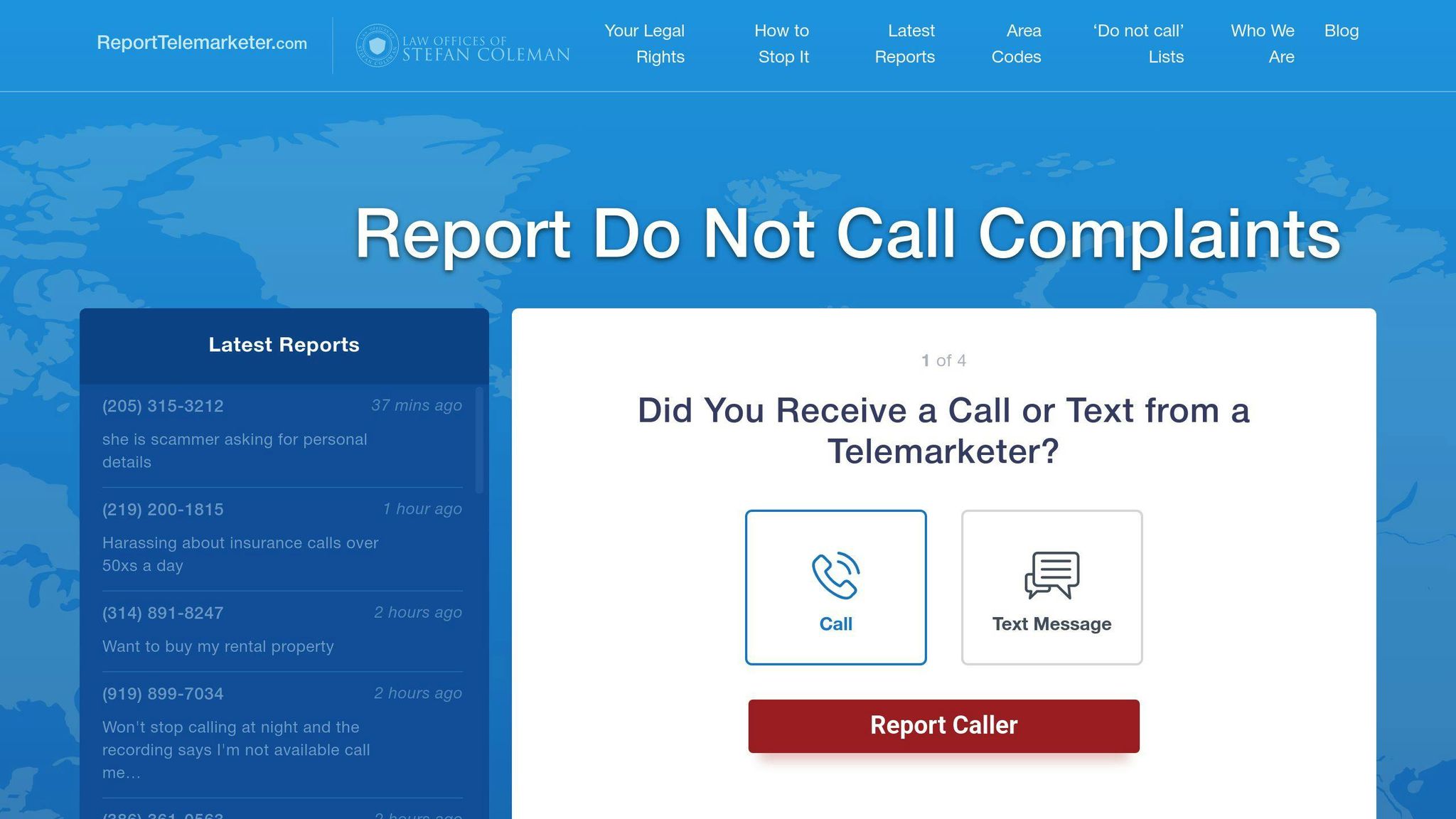
Tired of robocalls? Congress is acting. In 2024, two major bills – the Protecting American Consumers from Robocalls Act and the Do Not Disturb Act – aim to stop unwanted telemarketing calls, especially those using AI and advanced technologies like voice cloning. Here’s what they propose:
- Expanded Robocall Definition: Includes AI-generated and deepfake calls.
- Stronger Penalties: $500 minimum fine per violation.
- Small Business Protections: Adds small businesses to the Do-Not-Call Registry.
- Free Blocking Tools: Requires telecom providers to offer free robocall-blocking tools.
These measures, alongside new FCC and FTC regulations, promise stronger enforcement and better consumer protections. Use tools like ReportTelemarketer.com to take action against violators while leveraging free blocking features from your provider.
FCC bans AI-generated robocalls after fake Biden call urges Dems not to vote
Major 2024 Robocall Bills in Congress
As public frustration with robocalls continues to grow, lawmakers are working to update telemarketing laws to tackle both old and new challenges. In 2024, two major legislative proposals have been introduced to address the issue.
Protecting American Consumers from Robocalls Act
The Protecting American Consumers from Robocalls Act is a bipartisan effort aimed at improving enforcement and safeguarding consumers. Introduced by Senator Dick Durbin and Representative Jan Schakowsky, the bill has received backing from several prominent lawmakers, including Tammy Duckworth, Bernie Sanders, and Peter Welch.
Here’s what the Act brings to the table:
| Feature | Impact |
|---|---|
| Small Business Protection | Allows small businesses to join the Do-Not-Call list |
| Stronger Enforcement | Sets a $500 minimum fine per violation and boosts regulatory oversight |
| Private Right of Action | Empowers individuals to take direct legal action for TCPA violations |
Do Not Disturb Act
The Do Not Disturb Act, spearheaded by Representative Frank Pallone, focuses on combating AI-powered robocalls and adapting protections to address modern threats. It specifically targets advanced technologies like voice cloning and deepfake-enabled calls.
Under this proposal, the FCC would gain broader authority to regulate these technologies and enforce stricter compliance measures. According to the Electronic Privacy Information Center, these changes could drastically reduce unwanted telemarketing calls. Legal experts also anticipate an increase in enforcement actions and lawsuits.
These bills represent a focused effort to counter the shifting tactics of telemarketers and provide stronger protections for consumers.
New Consumer Protections in 2024 Bills
The 2024 robocall bills introduce new measures aimed at protecting consumers from unwanted calls and telemarketing scams. These updates focus on modernizing telemarketing laws and giving consumers stronger tools to combat emerging risks.
Expanded Definition of Robocalls and Tougher Penalties
The Do Not Disturb Act now includes threats like deepfake calls and AI-powered impersonations by broadening the definition of robocalls to cover AI-generated content and voice cloning. This update closes gaps left by earlier laws. To discourage violations, the bills propose stricter penalties, including a $500 minimum fine for each infraction and higher fines for AI-related violations.
"By putting real enforcement behind each violation of the Do-Not-Call Registry, the Protecting American Consumers from Robocalls Act will protect Americans from the scammers on the other end of the phone line", stated Senator Dick Durbin.
Free Robocall-Blocking Tools from Telecom Providers
One major update in the 2024 legislation requires telecom providers to offer free robocall-blocking tools. These tools help consumers block unwanted calls and reduce their occurrence. When paired with reporting services, they also assist in identifying and stopping illegal callers, providing stronger privacy protections.
These consumer-first measures align with broader regulatory efforts by agencies like the FCC and FTC.
sbb-itb-a8d93e1
Role of Regulatory Agencies
The Federal Communications Commission (FCC) and Federal Trade Commission (FTC) are taking action to implement and enforce new robocall laws, focusing on both technology advancements and consumer protection.
FCC Regulations on AI-Generated Calls
The FCC has rolled out new rules aimed at AI-generated calls. Telemarketers are now required to obtain clear, written consent from consumers before making robocalls, closing a major gap in earlier regulations.
Using its authority under the Telephone Consumer Protection Act (TCPA), the FCC has introduced stricter rules to address AI-generated robocalls specifically.
"We’re ensuring sellers obtain proper consent before contacting consumers", said an FCC spokesperson.
While the FCC hones in on AI-specific issues, the FTC is broadening its scope to tackle telemarketing fraud on a larger scale.
FTC Updates to Telemarketing Sales Rule
The FTC has revised its Telemarketing Sales Rule (TSR) to address new challenges in the industry. Key updates include:
| Area of Change | New Requirements |
|---|---|
| Business Protection | Extended fraud protections to cover business entities |
| Record Keeping | Adjusted requirements to reflect modern technology |
| Enforcement Measures | Strengthened collaboration with the FCC to combat international robocalls and AI-based fraud |
These changes reflect a growing recognition of how telemarketing threats have evolved. The FTC’s updates align with broader legislative efforts to modernize laws and address challenges posed by AI.
Consumer Actions Against Robocalls
The 2024 legislation not only boosts enforcement efforts but also provides consumers with practical ways to tackle robocalls.
ReportTelemarketer.com

ReportTelemarketer.com is a platform designed to assist individuals dealing with relentless robocalls. It offers free investigation and legal support for those targeted by unwanted telemarketing calls or texts.
Here’s how it works:
| Step | Action | Outcome |
|---|---|---|
| Report | Submit details about unwanted calls/texts | Creates a documented record of violations |
| Investigation | Identify potential legal breaches | Pinpoints the consumer protection laws violated |
| Legal Action | File cease-and-desist letters or complaints | Stops the calls and may lead to monetary recovery |
When applicable, attorney fees are recovered directly from the violators. While legal action is one option, consumers can also use free tools from telecom providers to block robocalls at the source.
Using Free Robocall-Blocking Tools
Telecom companies now offer more effective robocall-blocking tools, thanks to updated regulations. To make the most of these tools:
- Contact your service provider to activate blocking features and adjust settings as needed.
- Report any robocalls that slip through to improve the system’s accuracy over time.
The Electronic Privacy Information Center estimates that recent regulatory measures could significantly reduce unwanted telemarketing calls and texts. Each violation may result in damages of up to $500.
For the best results, combine these approaches: use robocall-blocking tools to prevent calls and report persistent offenders through platforms like ReportTelemarketer.com. This strategy merges technological defenses with legal solutions enabled by the new legislation.
Conclusion: Future of Robocall Regulations
The 2024 congressional bills are reshaping robocall rules with tougher enforcement measures and added protections for consumers. The FCC’s focus on closing loopholes, paired with an expanded TCPA scope, marks a decisive step in regulating telemarketing practices. This plan revolves around three main strategies:
| Strategy Component | Implementation | Expected Impact |
|---|---|---|
| Legislative Framework | Broadened TCPA scope for stricter enforcement | Stronger legal backing |
| Regulatory Oversight | Improved FCC/FTC monitoring and penalties | Better adherence to rules |
| Consumer Empowerment | Free tools and reporting platforms for action | Reduced violations |
According to the Electronic Privacy Information Center, these regulations could drastically reduce the majority of unwanted telemarketing calls and texts. With hefty financial penalties for violations, telemarketers now have a strong reason to comply.
The success of these efforts hinges on consumers actively using resources like ReportTelemarketer.com and adopting robocall-blocking tools. As these initiatives gain traction, individuals will have more control than ever to stop unwanted calls using both legal and technological solutions.